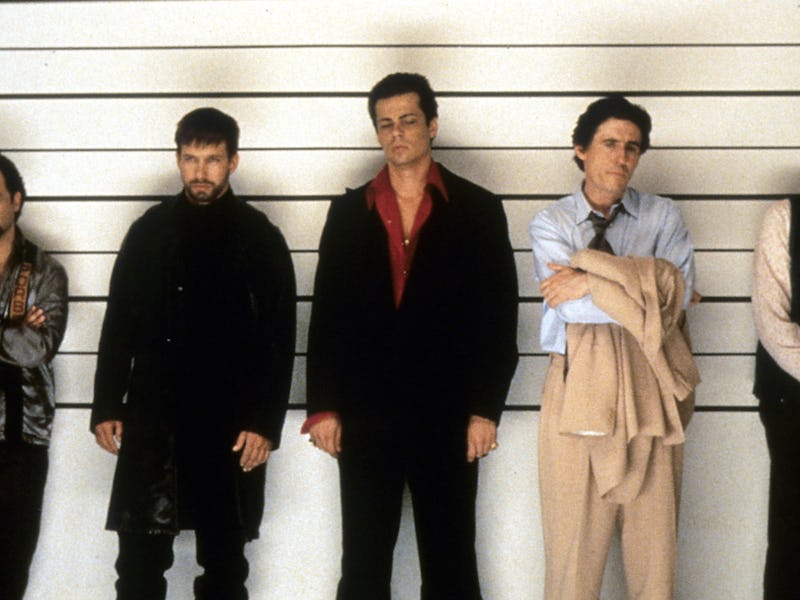This week marks the 20th anniversary of The Usual Suspects. No-one saw Bryan Singer’s head-scratching, twisty-turvy breakout coming. It won over audiences, hunkered down in cinemas, and sat in front of TVs across the globe with its sneaky storytelling. At the time of release and still today, throngs of fans continue to stand by their original assessment of the film. For those loyalists, it’s no longer just a movie but a yardstick for measuring coolness, and a way to take the temperature of your pop culture credentials. You think you’re a cinephile? Then pull up a chair, get comfy, and tell me how you sussed out the twist. So, is it still really worthy of the acclaim?
Singer’s creation had humble aspirations. A small budget that wouldn’t cover the marketing costs of a Marvel movie, its visual style is indicative of its era. Like dozens of ‘90s indies, its lo-fi roots beat strong. From the close-ups stifling the spaces around actors to the establishing shot zooms to the long stretches of screen time dedicated to dialogue, the film was a force. A scant budget meant going the extra mile on meager rations - and it pushed Singer to forge intrigue without the flourishes afforded his more recent superhero work. Making the most with what you’ve got is exactly why this $6 million-dollar movie is such an innovative piece of filmmaking.
Take the cast, for instance. Aside from Gabriel Byrne — who had to be convinced to take the part of Keaton — the next biggest star at the time was Kevin Spacey. Fresh off of being a total bastard of a different calibre in Swimming With Sharks, he makes method acting look like fun. Benicio Del Toro’s Fenster is a barely comprehensible buffoon — a concept Del Toro himself dreamt up to fuck with the other actors. Kevin Pollock and Stephen Baldwin held a fistful of good performances beforehand, but no-one was gonna put their names above the title. All of ‘the usual suspects’ had just enough anonymity to really sell their onscreen personas. And when Singer let those five lead actors run off leash - they all broke character repeatedly due to Del Toro’s prolific flatulence — the film’s brilliant line-up sequence was captured. It birthed an iconic moment in contemporary cinema… that revolves around five criminals reading the line “Hand me the keys you fucking cocksucker!”
Singer doesn’t deserve all the praise. It was along with screenwriter Christopher McQuarrie that the director perfected the art of the reveal. You know, the movie’s BIG TWIST. Mention the title in passing and its spectacular twist is likely the first comment. Did you see it coming? Could you figure it out? No-one did, or even could; there was no chance in Roman buggery that anyone paid close attention to the bottom of Chazz Palminteri’s coffee cup.
Interestingly, it’s the final moments which have largely defined how the movie is remembered: when that proverbial curtain pulls back, revealing that the unassuming scrap of a man whom we’ve listened to for the last 100 minutes — ten of which are spent blubbing — is Keyser Soze. The criminal kingpin steeped in myth who orchestrated the entire boat catastrophe, that was Kevin Spacey. Sadly, I never knew such joy. I watched it in 1995 before the advent of spoiler alert culture and thanks to some cocksucking motherfucker (not really, he was a good friend), I knew Spacey was Soze right from the beginning. I felt left out of the conversations surrounding this revelation because it wasn’t one for me, but for the rest of the world, it was a major talking point.
It arrived slap bang in the middle of the ‘90s. The decade when a film wasn’t worth seeing unless it blew your mind with an out-of-leftfield twist. Like The Sixth Sense, The Usual Suspects harnessed the power of a meaningful narrative turn through its attention to detail. Every single plot machination is wrung to better amp up the stakes, so when the wam-bam twist unravels, jaws drop — not just at the truth of Soze’s identity but also at the fact that the whole movie didn’t actually happen. Soze’s tightly-woven patchwork of lies only manage to function so effectively because the flashbacks ooze with confidence. The fiction fed to Customs officer Kujan bursts with life as the actors play out Soze’s version of events. We never see the full truth, only snatches of it here and there. McQuarrie won an Oscar for his script, and it’s not hard to see why.
There’s no mistaking the originality of basing a whole movie on a house of cards (ba-dum-tisch) without worrying that audiences would feel conned. Because that’s exactly the point. We’re right there with Kujan, when he’s hit by the realization that he’s been duped. He releases his white coffee cup. It spins. It smashes to the ground. The moment the first fissure streaks down its side is captured from three different angles. Just to hammer home how Kujan let the big fucking fish slip through his fingers. And we were right there with him.
To assess whether or not a film is a masterpiece depends on the criterion by which that status is defined. For The Usual Suspects that label has been erroneously slapped on it, in a misguided attempt to honor its ending. When really it deserves it for the cinematography, the direction, the acting, the dialogue. For everything that came before Spacey’s limp turned to a swagger.
